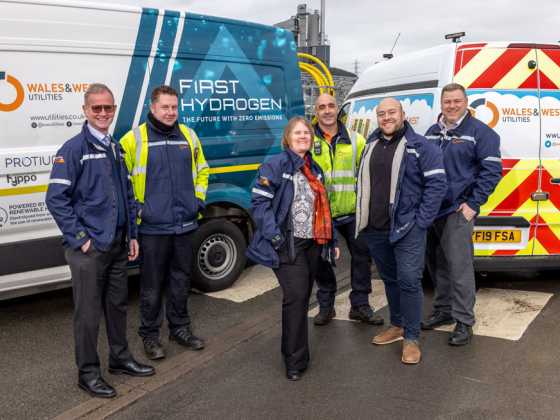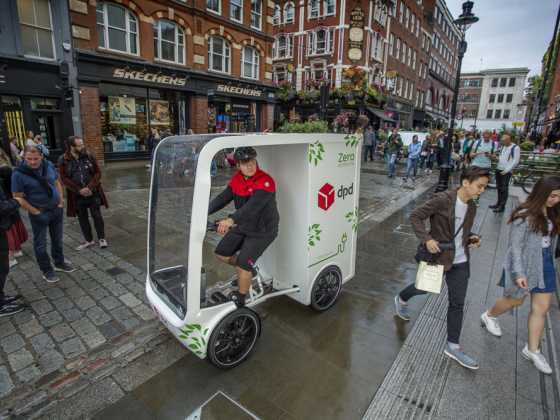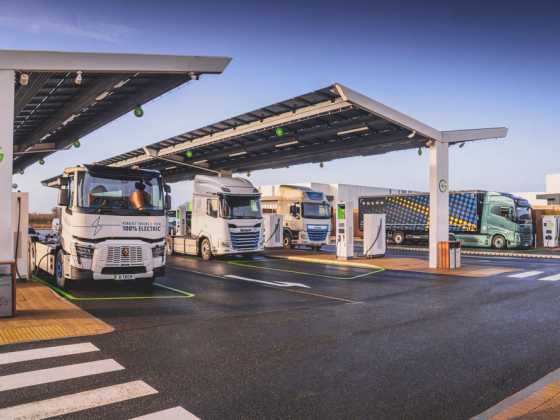Working together to lower London’s emissions
Following Transport for London’s LoCITY scheme launch to help the freight sector adopt low-emission vehicles, LoCITY explains the benefits of the industry working together to lower the emissions from commercial vehicles in London.
 Air pollution has a major damaging impact on the health of Londoners. Nearly 9,500 people die prematurely in London each year because of poor air quality. More than 281,000 daily journeys are freight related (HGVs and vans) – that’s 17 per cent across the day and 30 per cent in the peak hour.
Air pollution has a major damaging impact on the health of Londoners. Nearly 9,500 people die prematurely in London each year because of poor air quality. More than 281,000 daily journeys are freight related (HGVs and vans) – that’s 17 per cent across the day and 30 per cent in the peak hour.
With transport accounting for 63 per cent of NO2 (Nitrogen Dioxide) and 52 per cent of PM 10 (particulate matter) emissions, it is vital that we take action to reduce emissions from commercial vehicles.
In September 2020, London will be introducing the world’s first big city Ultra Low Emission Zone (ULEZ) in Central London. The ULEZ standards will be in addition to the congestion charge and the LEZ requirements. All vehicles will need to meet stringent exhaust emission standards or be subject to an additional daily charge to enter the zone.
In order to ensure vehicles using the zone are as clean as possible, low emission commercial vehicles which meet business needs must be available, affordable and cost-effective to operate. Infrastructure to support them must be installed in the right place and must be reliable.
Improving London’s air quality
LoCITY is an industry-led, technology neutral and open minded programme that has been established to help reduce the impact of emissions from commercial vehicles. It brings together the full range of stakeholders needed to stimulate the uptake of cleaner vehicles; vehicle manufacturers, fuel infrastructure providers, procurers, policy makers, trade associations and commercial fleet operators. By working together we can ensure the right technology, the right vehicles and the right fuels are in the right places at the right times.
At the LoCITY launch event in January 2016, Mike Brown MVO, London’s Transport Commissioner, said: “Over the next five years LoCITY will begin improving London’s air quality by encouraging the take up of low emission vehicles.
We’re working with vehicle manufacturers, infrastructure providers and the industry to make these vehicles a realistic choice for operators. Together we can improve London’s air quality, and by supporting the freight sector – which is essential for our city to function – we will have a real impact.”
Engaging and preparing
LoCITY aims to improve London’s air quality and reduce carbon emission by implementing the programme’s objectives including: engaging with freight and fleet operators, vehicle manufacturers and infrastructure providers to increase the availability and uptake of low emission commercial vehicles operating in London and prepare them for the introduction of ULEZ; and providing public and private fleets with information and guidance to inform their fleet renewal policies and upgrade to low emission vehicles and alternative fuels.
The programme is delivered in three parallel workstreams, each supported by an industry‑led working group. The first workstream focuses on increasing the supply and affordability of low emission commercial vehicles, including retrofit technology, to support operators in their fleet renewal decisions. The second aims to establish alternative fuel and supply chain infrastructure to support the uptake of cleaner commercial vehicles.
The third workstream aims to improve understanding through jargon-free communications and improved policies, procurement and land use planning guidelines to inform future decisions.
The first working group meetings took place in March 2016. The group members are committed to developing a detailed and comprehensive low emission vehicle roadmap, which will outline the practicalities of different solutions across different vehicle platforms and duty cycles.
LoCITY outputs will help inform a Fleet Advice Programme, case studies, environmental operating standards and contractual clauses for procurement bodies to easily adopt.
LoCITY will also demonstrate, through research and real world trials, that using cleaner vehicles does not impact business operations. It is supporting LowCVP in the development of their new accreditation scheme for after-market technologies.
Transport for London
LoCITY is aligned to other Transport for London (TfL) initiatives including projects and programmes that aim to minimise the number of road kilometres freight uses (e.g. mode switch, land use, changing market behaviour and consolidation), match the right solution (for example, retiming and using the right routes and places) and mitigate the impacts of freight (cleaner and safer vehicles for example).
In a call to action, Glen Davies, Freight and Fleet Programme Manager at TfL, said: “Upgrading your fleet with lower‑emission commercial vehicles or fitting kit to older vehicles will have a positive impact on public health, the environment, and climate change. It can also save you money through better efficiency and future‑proofing that pays off in the long‑term.
“We will soon be reaching out to organisations across the city to offer support and advice, but in the meantime we want to showcase some of the great work that people are already doing and demonstrate how this is a perfect time to upgrade your commercial fleet. Whether you are a local authority, a large organisation or a small business, if you have recently replaced or improved your vehicles, LoCITY would like to hear your experiences.”
LoCITY conference
The first annual LoCITY conference will be taking place on 25 May at London Guildhall. Speakers include: Mike Brown (London’s Transport Commissioner); Andy Eastlake (LowCVP); Bob Moran (OLEV); Neale Ryan (Innovate UK); Jonathan Bray (Urban Transport Group); Emma Slater (Leeds City Council); and Shaun Bosomworth (Northern Gas Networks).
Representatives from Databuild and Element Energy will present the results of the two LoCITY funded research projects that looked at the awareness and understanding of low emission vehicles and the barriers to wider up take.
Please contact enquiries@locity.org.uk if you would like to share your experiences or would like to attend the 25 May conference.






